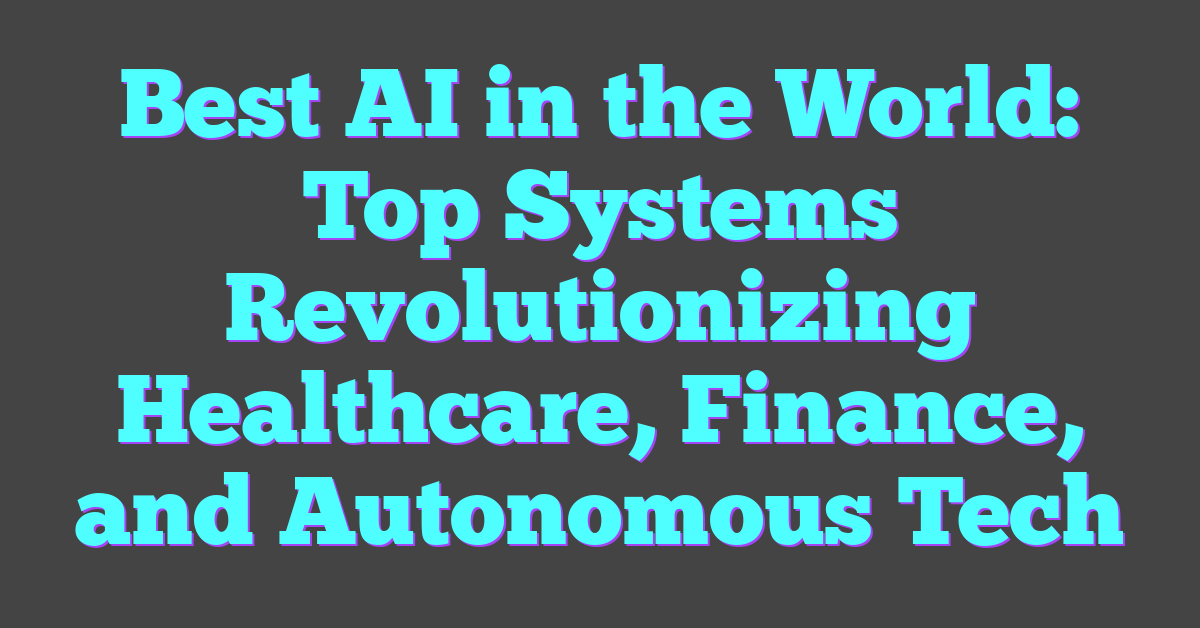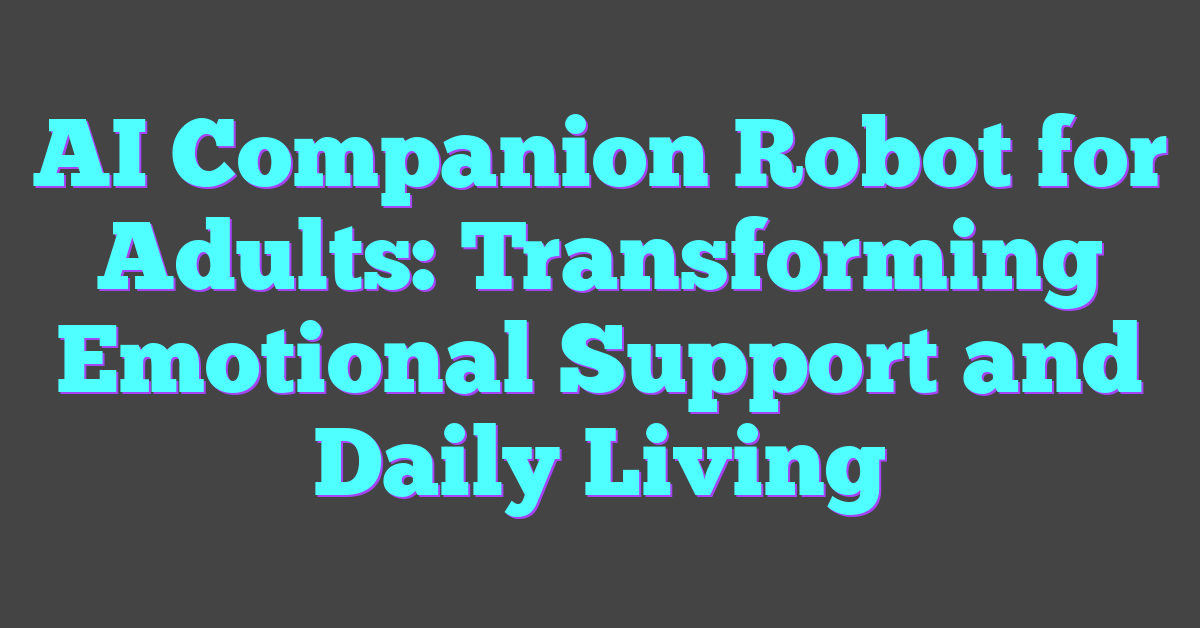Artificial Intelligence (AI) isn’t just a buzzword anymore; it’s revolutionizing the way we live, work, and interact with the world. From virtual assistants that manage our schedules to advanced algorithms that predict market trends, AI is everywhere, making our lives easier and more efficient. But with so many advancements, which AI systems truly stand out as the best in the world?
In this article, we’ll explore the top AI technologies that are setting new standards in innovation and performance. Whether it’s healthcare, finance, or everyday conveniences, these AI systems are pushing boundaries and redefining what’s possible. So, let’s dive in and discover the AI marvels that are shaping our future.
Overview of Leading AI Technologies
Artificial Intelligence (AI) continues to revolutionize multiple sectors. Let’s examine the criteria for evaluating these systems and explore emerging trends and innovations in AI.

Criteria for Evaluating AI Systems
Several criteria exist for evaluating AI systems:
- Accuracy: Measures how often predictions match the actual outcomes. Higher accuracy indicates better performance.
- Scalability: Evaluates the system’s capability to handle increasing amounts of data and computation.
- Usability: Assesses how easy it is for developers and users to interact with the system. Interfaces and documentation contribute to usability.
- Ethical Considerations: Involves ensuring that the AI system operates within ethical guidelines, considering factors like fairness and transparency.
- Real-time Processing: Determines the system’s ability to process data and provide outputs in real time.
Trends and Innovations
Current trends and innovations in AI include:
- Natural Language Processing (NLP): Advances in NLP, like GPT-4 and BERT, enhance machine understanding and generation of human language.
- AI in Healthcare: Technologies like IBM Watson assist in diagnostics and treatment planning, pushing healthcare boundaries.
- Autonomous Systems: Self-driving vehicles, such as Tesla’s Autopilot, showcase AI’s ability to perform complex, real-world tasks autonomously.
- AI in Finance: Algorithms improve trading strategies and risk assessments, with firms like BlackRock leveraging AI for portfolio management.
- Reinforcement Learning: Techniques involving models like AlphaGo help solve problems through trial and error, driving advancements in gaming and robotics.
These trends and evaluation criteria demonstrate AI’s vast potential, continuously reshaping various industries and pushing technological boundaries.
Top AI Systems in Various Industries
AI systems excel in myriad industries. They enhance efficiency, accuracy, and capabilities across sectors.
Healthcare AI Systems
AI revolutionizes healthcare by improving diagnostics, treatment plans, and patient management. IBM’s Watson for Oncology provides oncologists with data-driven insights by analyzing vast medical literature. The Mayo Clinic uses Google’s DeepMind for early detection of diseases like kidney injury. PathAI aids pathologists in identifying cancerous tissues accurately.
Automotive AI Applications
AI powers autonomous driving, enhancing road safety and user convenience. Tesla’s Autopilot utilizes AI for self-driving capabilities, interpreting surroundings in real-time. Waymo employs machine learning for navigation, ensuring safe driving decisions. Mobileye’s technology supports advanced driver-assistance systems (ADAS), providing collision warnings and lane-keeping assistance.
Financial AI Solutions
AI transforms finance by predicting market trends, detecting fraud, and automating customer interactions. JPMorgan’s COiN evaluates legal documents rapidly, saving thousands of hours annually. Kensho uses AI for data analysis, aiding investment strategies. Darktrace implements AI for cybersecurity, identifying and neutralizing threats in real-time.
Impact of Advanced AI on Society
Advanced AI technologies are leaving a significant footprint on various aspects of society. These technologies, which include sophisticated machine learning algorithms, neural networks, and deep learning, bring both opportunities and challenges that need consideration.
Economic Implications
Advanced AI has far-reaching economic impacts. Automation and AI-driven systems improve efficiency and productivity across industries. In manufacturing, robots and AI systems reduce production times and minimize errors in assembly lines. Financial institutions leverage AI for more accurate market predictions, potentially increasing profitability. AI-driven analytics enable businesses to make data-informed decisions, optimizing resource allocation and reducing costs.
Ethical Concerns and Regulations
AI advancements raise ethical concerns. Bias embedded in AI algorithms can lead to unfair treatment of individuals. Facial recognition systems, for instance, have demonstrated biases against certain demographics. Legal frameworks struggle to keep pace with AI’s rapid development, leaving gaps in accountability. Establishing comprehensive AI regulations ensures responsible usage and protects against misuse. Privacy concerns arise from AI’s ability to analyze large data sets, which can infringe on personal privacy when misused. Regulatory measures aim to balance innovation and ethical considerations.
These aspects showcase the layered impact of AI on society, underlining the need for balanced approaches to utilizing AI for economic advancement while ensuring ethical integrity.
Future Predictions for AI Development
AI development continues to accelerate, promising significant advancements across various sectors. Several key trends and predictions provide insights into where AI is heading next.
Growth of AI in Emerging Markets
Emerging markets are rapidly adopting AI technologies to drive economic growth and innovation. Countries in Asia, Africa, and Latin America are investing in AI to enhance sectors like agriculture, healthcare, and financial services. For example, AI-driven precision agriculture in India helps optimize crop yields by analyzing soil health and weather patterns. In Africa, AI-powered mobile health applications improve access to medical advice in remote areas. These regions benefit from AI’s ability to leapfrog traditional development stages, fostering rapid socio-economic progress.
Potential Breakthroughs in AI Technology
Several promising advancements in AI technology are on the horizon. Enhancements in neural networks could lead to more accurate natural language processing, making virtual assistants more intuitive and conversational. Quantum computing promises to exponentially increase computing power, potentially solving complex problems currently beyond the reach of classical computers. Moreover, AI may achieve greater autonomy in robotics, enabling more sophisticated interactions and applications in sectors like eldercare and disaster response. These technological breakthroughs hold the potential to redefine the capabilities and applications of AI, driving its evolution further.
AI’s future promises transformative growth and groundbreaking advancements, positioning it as a key driver of innovation and efficiency in global markets.
Conclusion
AI is no longer just a buzzword; it’s a transformative force reshaping various sectors. From enhancing diagnostics in healthcare to enabling autonomous driving and predicting financial trends, AI’s impact is undeniable. Its role in driving technological progress and economic efficiency is matched by the need for ethical considerations and regulations. As AI continues to evolve, emerging markets and advancements in technologies like neural networks and quantum computing promise even more groundbreaking developments. The future of AI holds immense potential, positioning it as a pivotal element in global innovation and efficiency.
Frequently Asked Questions
What are some common applications of AI in daily life?
AI is prevalent in virtual assistants like Siri and Alexa, providing market predictions, and enhancing efficiency in sectors like healthcare and finance. It helps improve diagnostics and treatment plans in healthcare, supports autonomous driving in automotive industries, and automates tasks in finance for better decision-making.
How is AI impacting the healthcare industry?
AI improves diagnostics, treatment plans, and patient care by analyzing vast amounts of data quickly and accurately. It helps healthcare professionals make better-informed decisions, potentially leading to improved patient outcomes and operational efficiencies.
What advancements are happening in Natural Language Processing (NLP)?
Recent developments in NLP allow machines to understand and generate human language more effectively. These advancements improve virtual assistants, enhance customer service through chatbots, and facilitate better data analysis in various fields.
What role does AI play in the finance industry?
In finance, AI predicts market trends, automates trading, personalizes customer interactions, and detects fraud. These applications help enhance efficiency, reduce human error, and provide more tailored financial services to clients.
What ethical concerns exist regarding AI?
AI poses ethical challenges like biases in algorithms, privacy concerns, and accountability in decision-making. Addressing these issues requires comprehensive regulations to ensure AI’s responsible and fair use without compromising ethical standards.
How is AI contributing to advancements in autonomous systems?
AI enables autonomous systems, such as self-driving cars, by processing data from sensors, making real-time decisions, and learning from experience. These advancements promise significant improvements in safety, efficiency, and convenience in transportation.
What economic impacts does AI have on different industries?
AI enhances manufacturing efficiency through automation, provides accurate market predictions in finance, and revolutionizes sectors like healthcare and automotive industries by improving operational capabilities, leading to economic growth and innovation.
How might AI develop in the future?
Future AI developments could include advancements in neural networks, quantum computing, and greater autonomy in robotics. These innovations promise transformative growth, making AI a crucial driver of global market efficiency and technological progress.
Where is AI expected to grow significantly in the coming years?
Emerging markets like Asia, Africa, and Latin America are expected to see significant AI growth. These regions are likely to benefit from AI’s potential to drive innovation, economic development, and improve quality of life.
What are the benefits of AI in manufacturing?
AI enhances manufacturing by improving efficiency, reducing costs, and increasing precision. Automation driven by AI can streamline production processes, minimize human error, and optimize resource use, leading to higher productivity and profitability.




